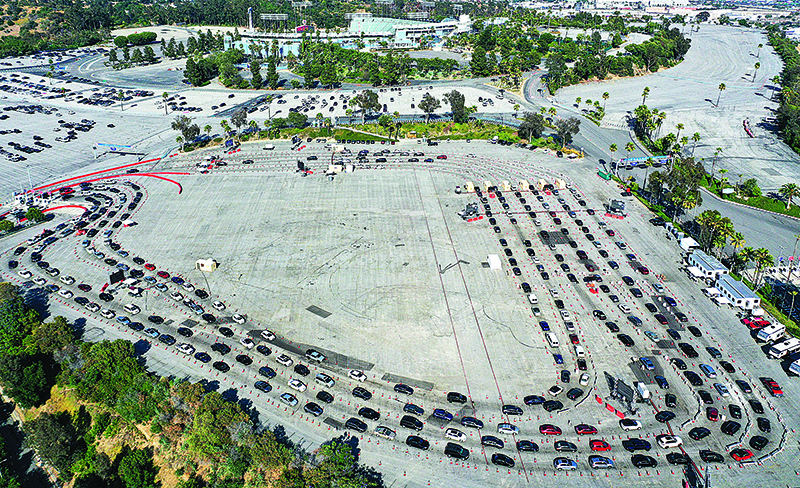
WASHINGTON: The United States and Europe battled a resurgence of coronavirus cases Friday, with Texas ordering bars to close and warnings mounting worldwide over lifting lockdowns too soon. Britons were told to avoid packed beaches while a major Australian city faced a surge in infections that prompted a warning against the hoarding of toilet roll.
But Sweden lashed out at the World Health Organization for listing it among at-risk European countries, in a sign of the sensitivities at play as countries try to manage the pandemic. More than 480,000 people worldwide have died from COVID-19 since it emerged in China late last year and cases are expected to reach 10 million across the globe within the next week. Countries have been balancing the need to reopen economies shattered by coronavirus shutdowns with the need to maintain sufficient measures to prevent a feared second wave.
‘Corral the spread’
In the United States, after hitting a two-month plateau, the rate of new cases is now soaring in southern and western states. Texas governor Greg Abbott ordered bars to close on Friday, further halting the phased reopening of the second most populous US state after California. Texas was among the most aggressive states in reopening in early June under Abbott, a Republican ally of President Donald Trump, who has faced sharp criticism for his handling of the crisis “This temporary pause will help our state corral the spread,” said Abbott.
The United States recorded 37,667 cases and 692 deaths in 24 hours, according to the Centers of Disease Control and Prevention, with nearly 122,000 lives lost overall - by far the highest confirmed toll in the world. US health officials now believe based on antibody surveys that some 24 million people may have already been infected - 10 times higher than the officially recorded figure of around 2.4 million. In Latin America, Brazil, the hardest-hit country in the region, had close to 55,000 deaths and 1.2 million infections, while Mexico on Thursday surpassed 25,000 fatalities.
‘Total mistake’
The World Health Organization warned Thursday that Europe is not yet in the clear, saying 11 nations faced a “very significant resurgence” that could push health systems “to the brink once again.” Sweden on Friday however accused the WHO of a “total mistake” by listing it along with 10 other countries that are mostly poorer nations in Eastern Europe and Central Asia, which is included in the WHO’s European region.
The Scandinavian country has made headlines for its high death toll after it opted not to introduce strict lockdowns. “We have an increase in cases because we have begun testing much more in Sweden the past week,” said Swedish state epidemiologist Anders Tegnell, adding that “all the other parameters” showed the number of serious cases was falling.
In Britain, people were urged to abide by social distancing rules after tens of thousands swarmed the seaside resort of Bournemouth during a heatwave. Police also criticized fans who gathered outside Liverpool’s Anfield ground Thursday night after the club secured the English Premier League football title for the first time in 30 years.
British Prime Minister Boris Johnson said people were “taking too many liberties with the guidance”. Britain has Europe’s highest death toll with 43,230. Ukraine meanwhile reported a record daily increase in coronavirus cases as authorities warned lockdowns might have to be re-imposed if people continued to flout restrictions. “People have ceased to comply with restrictions,” Prime Minister Denys Shmygal said.
‘Stop it, it’s ridiculous’
In Australia, supermarkets imposed purchase limits on toilet paper across the country Friday following panic buying by people rattled following a surge in coronavirus cases in Melbourne, the country’s second-biggest city. “Stop it, it’s ridiculous,” Prime Minister Scott Morrison told his compatriots
The early stages of coronavirus lockdowns in many countries were marked by panic buying of toilet paper and other supplies. However the pressure to reopen badly-hit economies and limit what promises to be a historic global recession remains immense. European Central Bank chief Christine Lagarde said Friday that the economy has “probably passed the lowest point”, while warning that “of course there could a severe second wave if we learn anything from the Spanish Flu” of 1918-19.
Airlines have suffered particularly badly, with the Dutch government announcing a 3.4 billion euro ($3.8 billion) bailout for Air France-KLM, Australia’s Qantas announcing it was cutting 6,000 staff and Germany’s Lufthansa getting the EU’s green light for a $10 billion state rescue. The world meanwhile awaits a vaccine or treatment that authorities say is likely to take until at least early next year and probably longer.
The WHO said a global initiative to speed up the development of tests, treatments and vaccines would require more than $30 billion over the next year — of which just over one tenth had been pledged. But in one piece of good news, fewer than one in a hundred children who test positive for COVID-19 die although a small but significant percentage develop severe illness, according to a new study led by experts in Britain, Austria and Spain.—AFP









